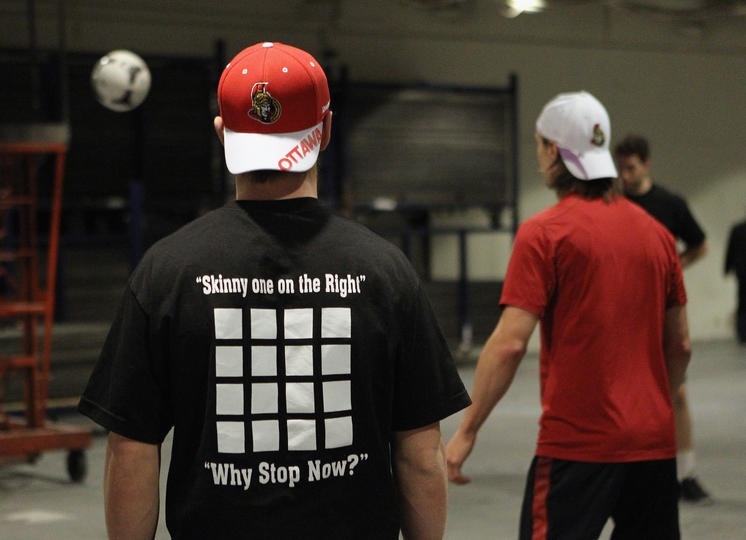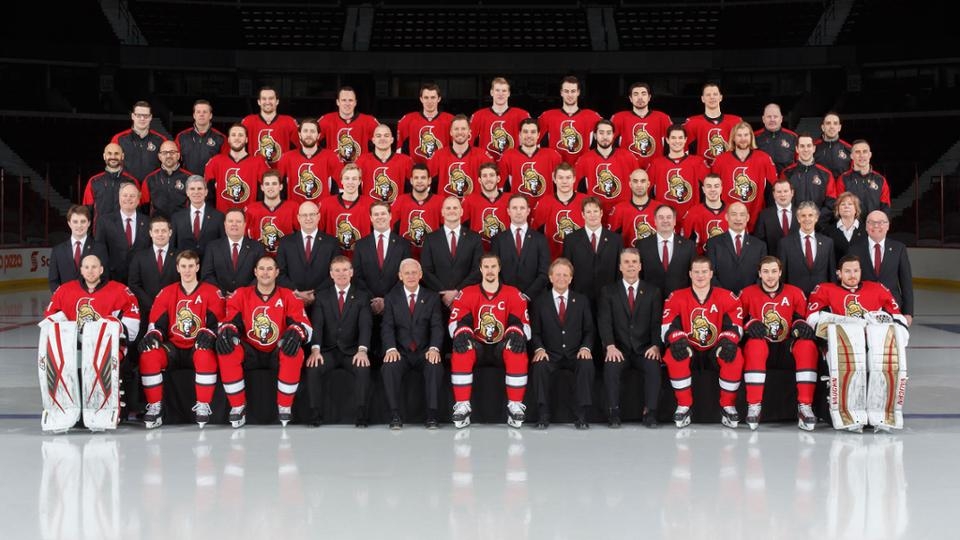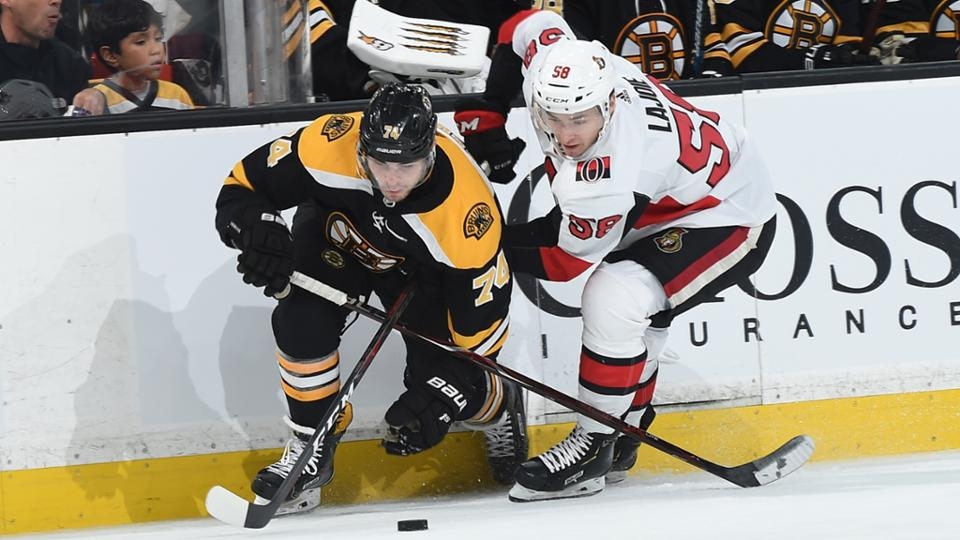
Eulogizing the Senators
Breakout, drop pass, gather, wind-up, wrister, twine, the last step serving as the swiftest route to pandemonium. The horn rang for 36 seconds, resonating from the sound booth to the rafters, delighting and fuelling the raucous crowd stretching the limits of the building’s capacity. Each decibel commemorated a landmark season that had begun 194 days before for the Ottawa Senators, one accompanied by a minimum of 82 twists and turns and one that would be cut short eight days and three cross-border flights later.
When Kyle Turris snapped his overtime winner over the shoulder of the Rangers’ Henrik Lundqvist on April 18th, he was met with a roar unlike any he’d heard in Glendale as a member of the Phoenix Coyotes. Anecdotally, it appears that the roar eclipsed any in other in the 16 years that the Senators have played at the Palladium, the Corel Centre or Scotiabank Place, as well as any in the franchise’s 20 total seasons of existence. In a year prolonged and defined by unforeseen, unforgettable, comeback, moral and statement victories, Turris’ tally cemented the sweetest win of all.
The win was one of just three in the first round of these playoffs, one devastatingly short of the marker necessary to advance. While past Senator teams would have been skewered nationally for failing to produce even a measly first-round victory, this unit was celebrated differently, having surpassed any sort of expectations by reaching the postseason in the first place. For a franchise who lorded over the NHL for nearly a decade without sipping from Stanley’s cherished Cup, the newfound role of underdog was one embraced by established veterans and unproven youngsters alike. It took a carefully constructed mélange of burgeoning superstars and role players with hearts emblazoned firmly on their sleeves to accomplish what the Ottawa Senators did in 2011-12, a diverse cast of characters that were, in a word, family.
The city of Ottawa awoke on April 27th much like it had in each day of the previous 20 years: without a Stanley Cup championship and smarting from another untimely playoff elimination. Past Senator squads, replete with considerable talent and the burden of anticipated success, wilted under the brighter lights of spring hockey, either bowing out in early rounds or hanging on until the bitter end, losing rapidly and violently on the game’s biggest stage.
The Stanley Cup playoffs are a series of theatrical performances, presented to the viewing audience in an escalating sequence of vignettes within the backdrop of two contrasting cities. They are epitomized by conflict (team vs. team, player vs. player, Shanahan vs. NHL fanbase), emboldened by familiarity and the overarching brutality of the sport. In the span of four to seven games, lengthened by overtimes and interspersed over the course of two weeks, an innumerable amount of storylines will emerge as players enter, fade or are forcibly withdrawn from the limelight, turning themselves and their teams into heroes or heels, champions or failures, or something in between.
These Senators were heroes and heels, depending on whom you talked to. The same goes for champions and failures, though neither term is particularly apt for characterizing a team whose final results place them in the very middle of the pack. Pre-season expectations had them failing miserably and historically, while post-Turris goal fantasies vacillated to Lord Stanley’s doorstep. They fell somewhere in between.
Nearly every man on the roster made their presence felt to some degree at some point during Ottawa’s seven playoff games. With the top scorers shackled through the first four, the Sens remained in the series on the strength of their previously unheralded grinders. Chris Neil, Matt Carkner and Zenon Konopka antagonized Rangers players and fans with their physical play and by chipping in offensively in the most crucial of moments. Neil banged in a rebound off Ryan McDonagh’s leg to clinch Game 2 in overtime. Carkner set the stage for the Game 4 comeback by slipping out of the penalty box and threading a nifty pass to Milan Michalek. Konopka cemented his reputation as one of the world’s premier faceoff men by securing draws at a tremendously high rate.
Moral justification aside, Ottawa needed Carkner’s beat-down of Brian Boyle in Game 2 to enter the series. Cast aside in Game 1, with the liberties taken by Boyle on Erik Karlsson reverberating from the defeat, the Senators announced that they would be no easy out by inserting Carkner and watching him turn a 6’7, 244lb man into a quivering punching bag. Boyle had every opportunity to defend himself, choosing to accept his beating in the hopes of capitalizing on the ensuing major penalty. Five minutes later, the Senators had killed off the major and officially entered the series.
Karlsson, tabbed for a perplexing roughing minor during the initial Boyle ruckus, struggled to produce offensively but remained Ottawa’s best skater. Spending nearly half the series on the ice, Karlsson matched the defensive prowess of the Rangers’ shutdown duo of McDonagh and Dan Girardi, much to the consternation of those who still dismiss the Swede’s ability in his own end. In a series marked by the Rangers’ rugged and aesthetically depressing defensive play, it is fitting that Karlsson’s lone goal (on 31 total shots) came from behind the goal line.
Up front, Jason Spezza was locked down for the most part by McDonagh and Girardi, but still won Game 5 with his two goals and led the team with five points. Despite the rampant trade talk that will ensue this (and every) offseason, the future captain was hardly the reason Ottawa failed to advance. Craig Anderson was nothing short of superb, while Daniel Alfredsson rebounded valiantly from a malicious Carl Hagelin elbow to score Ottawa’s lone Game 7 goal.
Like any evenly-matched series, it came down to bounces. In Game 1, the Senators didn’t show up to play. In Games 2 and 4, Ottawa came back, both physically and on the scoreboard, and won each minutes into overtime. Games 3 and 5 hinged on single snaps of the puck, set up by an unlikely ricochet and a dexterous saucer pass, respectively. Game 6 turned on a questionable penalty call, Game 7 on two defensive lapses, and the series lead was extinguished and then wrenched from Ottawa’s hands at the final horn.
The sadistic nature of sports is that it inevitably declares winners and losers based on cold numbers, maintaining the right to strike down a team’s season on the grounds of one series, one game, one bounce. The numbers exist to validate and regulate the Senators’ accomplishments, but not to define them; numbers should have no significant place in any proper eulogy. If there’s any lasting message that should be extracted from the 2011-12 Ottawa Senators season, it is this: the season cannot be defined by seven games or two goals or even 36 seconds. This season, of any, was never about the final result. This season was about identifying holes, topping expectations, refusing to yield to the NHL’s elite or accept what was postulated as inevitable. It was a season in which the unheralded became heralded, and on that note, I’d like to leave Jesse Winchester with the last word.












